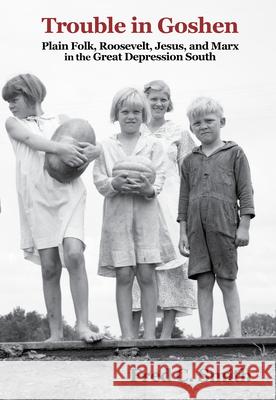Trouble in Goshen: Plain Folk, Roosevelt, Jesus, and Marx in the Great Depression South » książka
Trouble in Goshen: Plain Folk, Roosevelt, Jesus, and Marx in the Great Depression South
ISBN-13: 9781617039560 / Angielski / Twarda / 2014 / 213 str.
Trouble in Goshen: Plain Folk, Roosevelt, Jesus, and Marx in the Great Depression South
ISBN-13: 9781617039560 / Angielski / Twarda / 2014 / 213 str.
(netto: 232,28 VAT: 5%)
Najniższa cena z 30 dni: 241,40
ok. 30 dni roboczych.
Darmowa dostawa!
The Great Depression emboldened Americans to tolerate radical experimentation in search of solutions to seemingly overwhelming economic problems. Amongst the thorniest of those was rural southern poverty. In Trouble in Goshen, Fred C. Smith focuses on three communities designed and implemented to meet that challenge. This book examines the economic and social theories--and their histories--that resulted in the creation and operation of the most aggressive and radical experiments in the United States. Trouble in Goshen chronicles three communitarian experiments, both the administrative details and the struggles and reactions of the clients. Smith covers the Tupelo Homesteads in Mississippi, the Dyess Colony in Arkansas, and the Delta Cooperative Farm, also in Mississippi. The Tupelo Homesteads were created under the aegis of the tiny Division of Subsistence Homesteads, a short-lived, -first New Deal- agency. Dyess Colony was the largest of the Resettlement Administration's efforts to transform failed farmers into Jeffersonian yeoman farmers. The third community, the Delta Cooperative Farm, a product of the active cooperation between the Socialist Party of America and a cadre of liberal churchmen led by Reinhold Niebuhr, attempted to meld the pieties, passions, propaganda, and theories of Jesus and Marx. The equipment, facilities, and management styles of the projects reveal a clearly delineated class order among the poor. Trouble in Goshen demonstrates the class conscious angst that enveloped three distinct levels of poverty and the struggles of plain folk to preserve their tenuous status and avoid overt peasantry.











